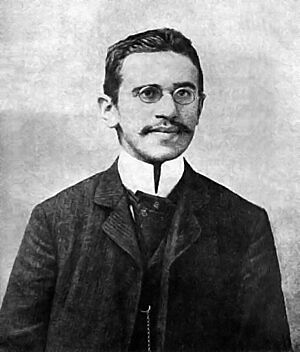Otto Weininger facts for kids
Quick facts for kids
Otto Weininger
|
|
|---|---|
 |
|
| Born | 3 April 1880 Vienna, Austria-Hungary
|
| Died | 4 October 1903 (aged 23) Vienna, Austria-Hungary
|
| Education | University of Vienna (PhD, 1902) |
| Era | 20th-century philosophy |
| Region | Western philosophy |
| School | Idealism Kantian ethics |
|
Main interests
|
Philosophy, logic, psychology, genius, gender, philosophy of religion |
|
Notable ideas
|
All people have elements of both femininity and masculinity Logic and ethics are one Logic is tied to the principle of identity (A=A) |
Otto Weininger (German: [ˈvaɪnɪŋɐ]; 3 April 1880 – 4 October 1903) was an Austrian philosopher who lived in the Austro-Hungarian Empire. In 1903, he published the book Geschlecht und Charakter (Sex and Character), which gained popularity after his death at the age of 23. Parts of his work were adapted for use by the Nazi regime. Weininger had a strong influence on Ludwig Wittgenstein, August Strindberg, and, via his lesser-known work Über die letzten Dinge, on James Joyce.
Life
Otto Weininger was born on 3 April 1880 in Vienna, a son of the Jewish goldsmith Leopold Weininger and his wife Adelheid. After attending primary school and graduating from secondary school in July 1898, Weininger registered at the University of Vienna in October of the same year. He studied philosophy and psychology but took courses in natural sciences and medicine as well. Weininger learned Greek, Latin, French and English very early, later also Spanish and Italian, and acquired passive knowledge of Swedish, Danish and Norwegian. While he was at the university, he would attend the Philosophical Society, where he heard, among others, Wagner's son-in-law Houston Stewart Chamberlain, he was regarded as an outsider but an original thinker.
Weininger's professors Friedrich Jodl and Laurenz Müllner accepted his thesis and he received his Ph.D. degree in July 1902. Shortly thereafter he became a Protestant.
In 1902 Weininger went to Bayreuth, where he witnessed a performance of Richard Wagner's Parsifal, which left him deeply impressed. Via Dresden and Copenhagen he made his way to Christiania (Oslo), where he saw for the first time Henrik Ibsen's liberation drama Peer Gynt on stage. Upon his return to Vienna, Weininger suffered from fits of deep depression. The decision to take his own life gradually took shape; after a long discussion with his friend Artur Gerber, however, Weininger realized that "it is not yet time".
In June 1903, after months of concentrated work, his book Sex and Character: A Fundamental Investigation was published by the Vienna publishers Braumüller & Co. The book contained his thesis to which three vital chapters were added: (XII) "The Nature of Woman and her Relation to the Universe", (XIII) "Judaism", (XIV) "Women and Humanity".
Although the book was not negatively received, it did not create the expected stir. Weininger was attacked by Paul Julius Möbius, professor in Leipzig, and was accused of plagiarizing. Deeply disappointed and seemingly depressed, Weininger left for Italy.
Back in Vienna, he spent his last five days with his parents. On 4 October, Weininger died in the Wiener Allgemeines Krankenhaus (Vienna General Hospital) and was buried in the Matzleinsdorf Protestant Cemetery in Vienna.
Influence on Wittgenstein
Ludwig Wittgenstein read Weininger's book as a schoolboy and was deeply impressed by it, later listing it as one of his influences and recommending it to friends. Wittgenstein is recalled as saying that he thought Weininger was "a great genius". However, Wittgenstein's deep admiration of Weininger's thought was coupled with a fundamental disagreement with his position. Wittgenstein writes to G. E. Moore: "It isn't necessary or rather not possible to agree with him but the greatness lies in that with which we disagree. It is his enormous mistake which is great."
Weininger and the Nazis
Isolated parts of Weininger's writings were used by Nazi propaganda, despite the fact that Weininger actively argued against the ideas of race that came to be identified with the Nazis.
Portrayals
Weininger is played by Paulus Manker in Ildikó Enyedi's My 20th Century (1989).
Works
- Geschlecht und Charakter: Eine prinzipielle Untersuchung, neunzehnte, unveränderte Auflage mit einem Bildnisse des Verfassers (Wien und Leipzig: Wilhelm Braumüller Universitäts-Verlagsbuchhandlung Gesellschaft M. B. H., 1920).
See also
 In Spanish: Otto Weininger para niños
In Spanish: Otto Weininger para niños


